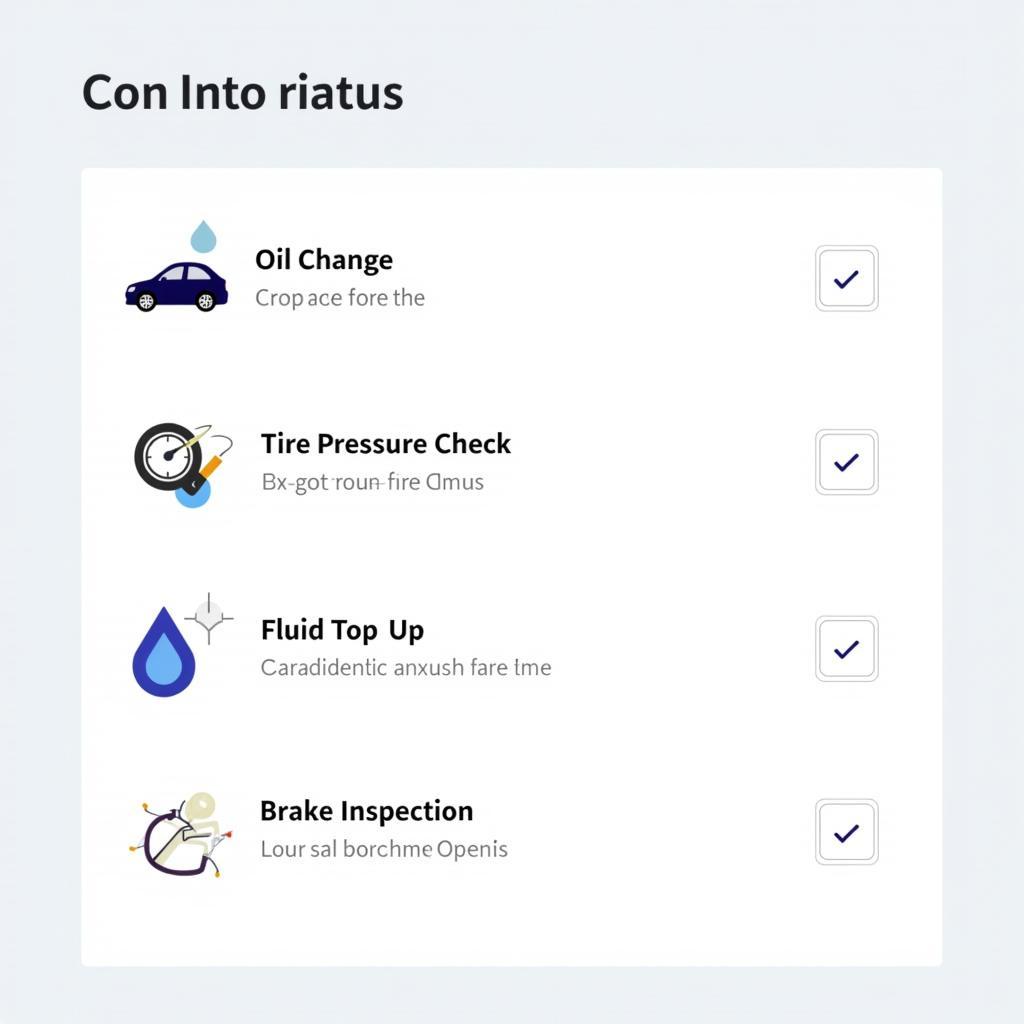How to Service Your Car Properly: A Comprehensive Guide
Taking care of your car doesn’t have to be a mystery. Knowing How To Service Your Car Properly not only keeps it running smoothly but also saves you money in the long run. Whether you’re a seasoned car enthusiast or a new driver, this comprehensive guide will provide you with all the information you need to service your car like a pro.
 Car Service Checklist
Car Service Checklist
Why is Regular Car Servicing Important?
Regular car servicing is essential for several reasons:
- Safety: A well-maintained car is a safe car. Regular servicing ensures that all safety-critical components like brakes, tires, and lights are in optimal condition, reducing the risk of accidents.
- Reliability: Consistent servicing keeps your car running smoothly and reliably. It prevents unexpected breakdowns and costly repairs by identifying and addressing minor issues before they become major problems.
- Fuel Efficiency: A well-tuned engine consumes less fuel. Regular servicing, including oil changes and air filter replacements, helps maintain optimal engine performance and improves fuel efficiency.
- Resale Value: A car with a comprehensive service history holds a higher resale value. It shows potential buyers that the vehicle has been well-maintained and is a worthwhile investment.
Understanding Your Car’s Service Schedule
Every car comes with a manufacturer-recommended service schedule outlined in the owner’s manual. This schedule outlines specific maintenance tasks and their recommended intervals based on mileage or time, whichever comes first.
Important Note: Don’t ignore those dashboard warning lights! They are your car’s way of communicating potential problems. If a warning light illuminates, it’s best to get it checked by a qualified mechanic as soon as possible.
 Car Dashboard Warning Lights
Car Dashboard Warning Lights
Essential Car Servicing Tasks
While the specific tasks and intervals may vary depending on your car’s make, model, and age, here are some essential car servicing tasks that apply to most vehicles:
1. Oil and Filter Change
Engine oil lubricates moving parts, reduces friction, and prevents engine wear. Over time, oil degrades and loses its effectiveness. Regular oil changes, typically every 3,000 miles or 3 months (consult your owner’s manual for specific intervals), are crucial to maintain optimal engine performance.
2. Air Filter Replacement
The air filter prevents dust, debris, and contaminants from entering the engine. A clogged air filter restricts airflow, reducing engine performance and fuel efficiency. Replacing the air filter every 12,000 miles or 12 months is recommended.
3. Tire Rotation and Pressure Check
Rotating tires ensures even wear and tear, extending their lifespan. Tire pressure should be checked regularly (at least monthly) and adjusted to the manufacturer’s recommendations. Proper tire pressure ensures optimal handling, fuel efficiency, and tire safety.
4. Brake Inspection and Service
Brakes are a critical safety feature. Regular brake inspections check for wear and tear on brake pads, rotors, calipers, and brake fluid. Brake fluid should also be flushed and replaced periodically to maintain optimal braking performance.
5. Fluid Level Check and Top-Up
Your car relies on various fluids like coolant, transmission fluid, power steering fluid, and windshield washer fluid to function correctly. Regularly check these fluid levels and top them up as needed.
“Regular preventative maintenance is far more cost-effective than dealing with major repairs down the line. It’s about addressing small issues before they become big problems.” – John Smith, Senior Automotive Technician at XYZ Auto Repair.
DIY vs. Professional Servicing
While some car maintenance tasks, like checking fluid levels or changing the air filter, can be done by car owners with basic mechanical skills, it’s generally recommended to leave more complex tasks, like engine repairs or brake servicing, to qualified mechanics.
Professional mechanics have the expertise, tools, and experience to diagnose and repair car problems accurately. They can also identify potential issues that may go unnoticed by untrained eyes.
Finding a Reputable Car Service Center
Choosing the right car service center is crucial for ensuring quality service and peace of mind. Here are some tips for finding a reputable mechanic:
- Ask for recommendations: Seek recommendations from family, friends, or colleagues who have had positive experiences with car service centers.
- Check online reviews: Read online reviews and ratings on websites like Yelp, Google My Business, or specialized automotive forums.
- Look for certifications: Choose a service center that employs ASE-certified technicians. ASE certification indicates a high level of knowledge and competence.
- Consider specialization: Some service centers specialize in specific car makes or models. If you own a particular brand, consider a specialist shop for specialized expertise.
- Inquire about warranties: Reputable service centers stand behind their work and offer warranties on parts and labor.
Conclusion
Servicing your car properly is essential for its longevity, safety, and performance. By following the manufacturer’s recommended service schedule, staying vigilant about warning signs, and choosing a reputable service center, you can keep your car running smoothly for years to come. Remember, a little preventative maintenance goes a long way in ensuring a safe and enjoyable driving experience.

